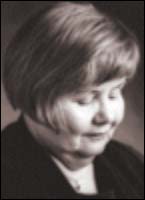| Translation: Khaled Mattawa  During my long, boring hours of spare time During my long, boring hours of spare time
I sit to play with the earth's sphere.
I establish countries without police or parties
and I scrap others that no longer attract consumers.
I run roaring rivers through barren deserts
and I create continents and oceans
that I save for the future just in case.
I draw a new colored map of the nations:
I roll Germany to the Pacific Ocean teeming with whales
and I let the poor refugees
sail pirates' ships to her coasts
in the fog
dreaming of the promised garden in Bavaria.
I switch England with Afghanistan
so that its youth can smoke hashish for free
provided courtesy of Her Majesty's government.
I smuggle Kuwait from its fenced and mined borders
to Comoro, the islands
of the moon in its eclipse,
keeping the oil fields in tact, of course.
At the same time I transport Baghdad
in the midst of loud drumming
to the islands of Tahiti.
I let Saudi Arabic crouch in its eternal desert
to preserve the purity of her thoroughbred camels.
This is before I surrender America
back to the Indians
just to give history
the justice it has long lacked. I know that changing the world is not easy
but it remains necessary nonetheless. Dagbjartsdóttir:
(Iceland- 1930-) was born near Seydisfj?rdur in the Eastern Fjords, grew up in a tradional community, still largely untouched by the modern world. Despite her traditional upbringing, she converted to communism before she was eighteen and went to Reykjavik to study. She became a confirmed communist and an equally confirmed feminist, and for years took an active role in Iceland's political life.
From 1955 she worked as a teacher in Reykjavik.
Politics and feminism live only in oblique references in her poems, mostly when she reflects on the poetry and personalities of like-minded poets whose work she has translated.In these particular poems she may take an original view of famous heroins in sagas and novels.
The bulk of her poetry, however, deals with different matters: the search for one's self and the struggle to come to terms with one's essential loneliness and the pain of irrecoverable loss. Loneliness, she says, is a fundamental theme in her work, expressed in ever recurring images such as night, moon, the dark depths of water, the relentless clock which chimes the hours in many a poem in her latest collection, The Clock in the Tower.
In many poems she shows herself a keen and loving observer of children, and a sympathetic understander of their, often harrowing, doubts and fears. Vilborg's poetic output is small, resulting from her habit of living with a poem for months, even years, before deciding to publish it. Although she has the ability to write poems in the Icelandic tradition (with prescribed alliteration, occasional internal rhyme, and end-rhyme) she has always preferred a free form for her poetry. She tries to be simple and clear, with careful control of sound and rhythm | |